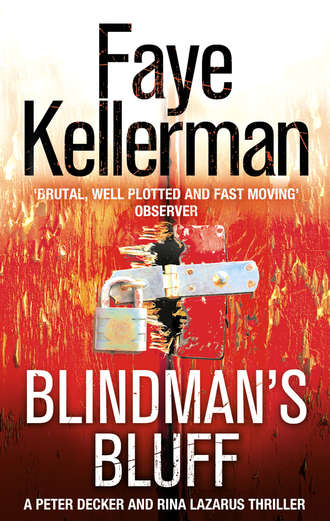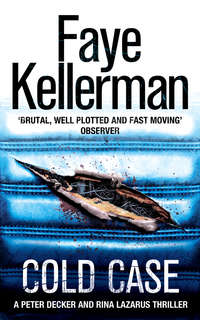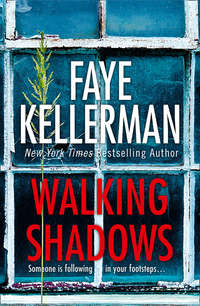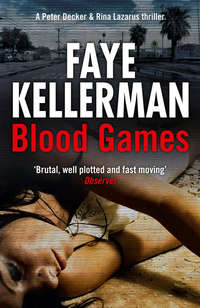
Полная версия
Blindman’s Bluff
“Names?” Decker asked.
“Kotsky doesn’t know who was on duty tonight, but he said once he sees them, he can identify them.”
“What about the two guards in the main house?”
“They appear to be missing,” Marge said.
“So two guards missing and two guards murdered.”
Marge and Oliver nodded.
“Oliver mentioned a murdered maid?”
“In the servant’s bedroom downstairs.”
“And how did Ana Mendez manage to dodge the bullet?”
“She was off tonight,” Oliver said. “Her story is that she had returned to the ranch around one in the morning.”
“How’d she get back? No public transportation for miles.”
“She has a car.”
“She didn’t notice the lack of guards in the guardhouse?”
Marge said, “She went around through the back gate at the service entrance. No guards are routinely stationed there. Ana has a gate access card. She gets in, parks her car, and goes into her room. She sees the body and starts screaming for help. At this point, it gets a little muddy. She apparently went upstairs and found the other bodies.”
“She went upstairs without knowing if there were still people in the house?” Decker asked.
“I told you, her story’s a little confusing. Once she saw the bodies, she called Kotsky and he reported the crime…I think.”
“I’ll talk to her again. She’s Spanish speaking?”
“She is, although her English is pretty good.”
Decker said, “On to the guards. Do you know who arranges their schedules?”
Oliver said, “Kotsky makes the assignments but doesn’t arrange them. That’s done by a man named Neptune Brady who is the Kaffeys’ head bodyguard. Brady has his own bungalow on the grounds, but for the past few days, he’s been visiting his sick father in Oakland.”
“Has anyone contacted him?”
“Kotsky called him up and told us that Brady chartered a jet and should be here soon.” Marge paused. “We did take a brief peek inside his bungalow just to make sure no one else was dead. I didn’t rifle through his room. We’ll need a warrant to do that.”
“Let’s put in for one in case Brady’s uncooperative.” Decker looked around the room. “Ideas on how this played out?”
Oliver said, “Gilliam was sitting in front of the fireplace, sipping wine and reading. Marge and I think that she went down first. She’s still slumped on the couch, her book is a few feet away, covered in blood. See for yourself.”
Decker walked over to the scene. Sprawled on the couch were the remnants of a beautiful woman. Her blue eyes were open and blank, and her blond hair was matted with caked blood. The woman’s torso had been nearly bisected at the waist by several shotgun blasts. It was sickening, and Decker involuntarily averted his eyes. There were some things he’d never get used to.
“This is carnage,” he said. “We’ll need lots of photographs because our memories aren’t going to be able to process all of this information.”
Marge continued, “The disturbance of someone entering the room must have drawn the attention of the father and son. We figured they went down next.”
Oliver said, “There are two Kaffey sons. The one who was shot was the older one, Gil.”
“Does he have immediate family who need to be notified?” Decker asked.
“We’re working on it,” Oliver said. “No one’s called any police station to ask about him.”
“What about the younger brother?” Decker asked.
Marge said, “Piet Kotsky told me that the younger son’s name is Grant and he lives in New York. So does Guy’s younger brother, Mace Kaffey.”
“Who is also in the business,” Oliver pointed out. “Both of them have been notified.”
“By who? Kotsky? Brady?”
Marge and Oliver shrugged ignorance.
“Back to the crime scene,” Decker said. “Any idea what Guy and Gil were doing?”
Oliver said, “They could have been talking business, but we didn’t find papers.”
Marge said, “Guy Kaffey probably stood up and saw what was happening to his wife. Then he was blown backward. The son was a little quicker and started running away when the bullets caught him. He went down a few feet away from one of the doors out of here.”
“And the shooters didn’t bother to check to make sure he was dead?”
Marge shrugged. “Maybe something distracted the shooters and they fled.”
Decker said, “We have one, two, three…six doors in the room. So we could have a band of shooters with each one coming in from a different door and overwhelming the couple. Any idea of what could have sent a posse of murderers out of the ranch without finishing off the son?”
Oliver shrugged. “Maybe an alarm, although we haven’t decoded the system yet. Maybe the maid coming into the house. But she didn’t see anyone leave.”
Decker thought a moment. “If everyone was drinking and relaxing, it probably wasn’t too late: after dinner but early enough for a nightcap—around ten or eleven.”
“Around,” Marge said.
“And the groomer and the groundskeeper,” Decker said, “were they in the house when you arrived?”
“Yes.”
“You said that they live here?”
Oliver said, “In the bungalows on the grounds.”
“So how did they find out about the murders? Did someone get them or were they awakened by the noise or…”
The two detectives shrugged.
“We’re going to be camped out here for a while.” Again, Decker massaged his aching head. “Let’s let CSI, the photographers, and the coroner investigators do their things here in the library. We’ve still got a couple of other crime scenes and witnesses to interview. Where are the other bodies?”
Marge showed him the area on her map. Decker said, “I could use one of those.”
Oliver gave his to the boss. “I’ll get another one.”
“Thanks,” Decker said. “You two take over the other crime scenes, and I’ll talk to the witnesses, especially the Spanish speakers. I’ll see if we can piece together a time frame and a chain of events.”
“Sounds like a plan,” Marge said. “Ana is in this room.” She showed him on the map. “Albanez is here and Karns is here.”
Decker marked the rooms on the map. Then he wrote each name on the top of a piece of paper in his notebook. There were a slew of players. He might as well start the scorecard.
CURLED UP IN a chair, Ana Mendez had just about disappeared. She seemed to be in her late thirties and was diminutive in size—under five feet—with almond skin stretched over a broad forehead and pronounced cheekbones. Her mouth was wide, her eyes round and dark. Her hair had been clipped into a pageboy, giving her face the appearance of someone staring out the window with two black drapes on the side and her short bangs being the valence curtain.
The maid had been sleeping, but woke up when Decker walked into the room. She rubbed her eyes, swollen from crying and squinting in the bright artificial light. He noticed that her white house-keeper’s uniform was smeared with brown stains and made a mental note to give the clothing to CSI.
Decker asked her to start from the beginning. This was her story.
Ana’s day off went from Monday evening to Tuesday evening. Usually she returned to the ranch earlier in the evening, but last night was a special function at her church, including a short midnight prayer service. She left afterward, around 12:30, and drove back to the ranch, arriving around an hour later. The mansion was entirely enclosed with heavy, wrought-iron fencing that had spikes on top, so most of the gates were unguarded. She had a card key for the gate closest to the kitchen. After she entered the premises, she drove to the service lot, parking her car behind the kitchen. She walked down a flight of steps to the service wing and used her bedroom key to get inside the building. When Decker asked about an alarm, she told him that the servants’ quarters was alarmed, but it wasn’t connected to the main house. The mansion had its own security system. This way, the help could go in and out without disturbing the Kaffeys’ safety system.
Her eyes swelled with tears when she described what she saw in the bedroom. She had turned on the light and there was blood everywhere—on the walls, on the carpet, on the two twin beds. But the worst part was Alicia: she was lying on her back and wasn’t moving. Her face had been shot off. It was horrible. Terrifying. She started screaming.
The next part of her story was mixed with giant sobs. She ran upstairs: the interior stairs that led to the mansion’s kitchen. Normally the kitchen door was locked at midnight to prevent anyone using the servants’ entrance from coming into the main house. But not tonight. Ana distinctly remembered flying into the kitchen and screaming for the missus.
But no one answered.
When Decker asked her about the mansion’s alarm going off when she went into the kitchen, Ana couldn’t remember. She had been hysterical, and she apologized for her hazy memory.
Decker thought she was doing pretty well.
She discovered the Kaffeys in the library—first the men, then the missus. No one was moving so she thought they were all dead, including Gil. She had watched enough television to know that she shouldn’t touch anything.
Still screaming, she ran outside. She was alone and the grounds were dark and spooky. She knew where Paco Albanez’s bungalow was because she was friendly with the groundskeeper. But to get to Paco’s bungalow, she had to walk by the pool, cross over the tennis courts, and go through the fruit orchards. Riley Karns lived closer to the main house. Even though she didn’t know him well, she woke him up. He told her to stay in his quarters while he looked around. Around fifteen minutes later, Riley came back with Paco Albanez and the three of them tried to figure out what to do. They knew they had to call the police and since Riley spoke English, he volunteered. He told Paco and her to wait in his bungalow while he made the calls. Then he left. He came back about thirty minutes later with two policemen. The officers brought the three of them into the house and separated them. The policeman said that people would be talking to her. First it was the lady policewoman. Now it was him.
The story was a straightforward narrative. She didn’t seem overly addled nor did her words seem rehearsed. When she was done, she looked up at Decker forlornly and asked when could she leave? When he told her she needed to stay for a little while longer, she burst into tears.
Decker patted her hand and left to interview Riley Karns.
The groomsman was a tiny man with a strong grip and an even stronger English accent. His elfin features were set into a weathered face and his complexion was wan from horror as well as lack of sleep.
He had worked with horses for years—as a jockey, as a trainer, and as an equestrian jumper or doing dressage in horse shows. His job not only included tending to the horses and dogs, but also teaching Gilliam Kaffey basic equestrian skills. He wore dark sweats that appeared to be smudged with stains. When Decker asked if had changed his clothing tonight, he answered no. Karns’s account dovetailed with Ana’s story. He filled in Ana’s missing minutes—the half hour or so that she was alone with Paco Albanez in Karns’s bungalow.
Karns admitted that his first call should have been 911, but he wasn’t thinking so clearly. Instead, he had rung up Neptune Brady—the Kaffeys’ chief of staff. Karns knew that Brady was up north in Oakland visiting his father but he called him anyway. When the two of them connected, Neptune told Karns to call 911 immediately, then to ring up Piet Kotsky and have him get over to the ranch to find out what the hell went wrong. Brady told him that he was going to try to charter a private jet to get the hell down to L.A. He’d call Kotsky once his travel plans were firmed up. Brady also told Karns that he’d notify the family.
Karns simply did as he was told. He called 911, then he called Piet Kotsky who said he’d leave right away, but it would take him three hours to get to the ranch. An ambulance arrived about five minutes later, then the police came. He took a couple of officers over to his bungalow where Ana and Paco were staying. The police took them inside and separated them.
Paco Albanez was in his fifties—a mocha-complexioned man with gold eyes, gray hair, and a white handlebar mustache. He was built low to the ground with a barrel chest and thick forearms. He, like Ana, had worked for the Kaffeys for about three years. He didn’t have much to add to the mix. Karns woke him up with a start, told him to get his clothes on, and that a terrible tragedy had happened to the family. He was half asleep, but as soon as he saw how upset Ana was, he woke up pretty quickly. He stayed with Ana until the police arrived. His recitation also seemed on the up-and-up.
Decker left the interviews with many unanswered questions. Among them:
1 Why was the door to the kitchen unlocked?
2 Did the killers come through the staff quarters, murder the sleeping maid, and access the house through the kitchen? If so, who let them in?
3 Did the alarm go off when Ana went into the kitchen? And if it didn’t, who turned it off?
4 Who possesses keys to the main house besides the family?
5 Who knows the alarm code besides the family?
6 Who was the first one to realize that Gil Kaffey wasn’t dead?
7 And, finally, why didn’t the murderers make sure that Kaffey was dead?
There were housekeepers, guardhouse guards, mansion guards, a groundskeeper, a groomer, Piet Kotsky, and Neptune Brady. And this was Guy Kaffey’s personal staff. Decker could only imagine how complicated it would get when he got into the business—a corporation that employed thousands. The manpower devoted to such a high-profile case would be staggering. In his mind, he saw a bursting case file filled with a forest’s worth of felled trees. In recent months, their substation had started using paper from recycled pulp.
Go green.
Better than red: the predominant color of the evening.
THREE
THE TWO VOICES were deep and demanding. From the back, Decker noticed the bald guy first, garbed in loose-fitting chinos and a bomber jacket. He was thick necked and broad shouldered and appeared to be packing around 250 pounds of pure muscle. His companion had a head of thick black hair and wore gray slacks and a blue blazer. He was taller and leaner but also powerfully built. If they were football players, one would have been a tackle, the other a quarterback.
From the snippets of conversation, they appeared to be irate at the police. First they had been stopped like common criminals at the off-ramp, grilled like they’d done something wrong. And now Marge was refusing to let them see the crime scene. Though his favorite sergeant didn’t require help, Decker went over to investigate.
Marge made quick introductions: Piet Kotsky and then Neptune Brady. Kotsky was flushed, with sweat dripping off a protruding forehead. His eyes were big and deep-set, and his skin was tightly drawn over prominent cheekbones. His complexion was jaundice in color—the hue of mummified skin.
Brady was younger, in his early to mid thirties. His lean face had spent a lot of hours in the tanning salon. He had pale blue eyes, thick lips, and tightly curled dark hair. His arms were folded across his chest, his hands big and adorned with several gold rings. His chin jutted forward when he spoke. “Are you in charge?” Without waiting for a response, he said, “What the fuck happened?”
Decker said, “We’re still gathering information—”
“Do you know it took me about twenty minutes just to convince the idiots at the off-ramp that I actually had a reason to be at the ranch! Don’t you guys communicate with one another?”
Decker took a step backward, giving them both some space. “What can I do for you, Mr. Brady?”
“For starters, how about some answers?”
“As soon as I have them, I’ll pass them along. I’d like to ask you some questions.” He turned to Marge. “Why don’t you take Mr. Kotsky to one of the studies and interview him there, Sergeant.”
“What is this?” Brady’s nostrils flared. “Divide and conquer?”
“We’re not the enemy, Mr. Brady. And I need information.” Decker checked off items on his fingers. “We need a list of everyone who works at the house either full- or part-time. How many people are in the house at night at any one time? Who was supposed to be working last night? Who lives on the properties? Who lives off the properties? How long has each employee been working for the Kaffeys? Who has access keys? Alarm codes? Who hires? Who fires? Mundane information like that.”
Brady shuffled his feet. “I can help you. First, I’d like to see what happened.”
Marge said, “Mr. Kotsky, why don’t you come with me and let Lieutenant Decker and Mr. Brady conduct their business.”
Kotsky looked at Brady, who nodded. “Okay. Go into the east study.”
Marge said, “Where’s that on the map?”
“Piet will show you.”
After they had gone, Brady said, “I need to see what happened.”
“No one sees the victims unless it’s been cleared by the coroner’s investigators. We’re in charge of the death scene, but they’re in charge of the bodies.”
“Bureaucracy!” Brady spat out. “No wonder the police don’t get anything done.”
Decker stared at him. “We get things done, but because we want to do them right, we’re careful. Do you think Mr. Kaffey would let anyone inside the boardroom at his company just for the asking?”
Brady said, “The difference is I’m a taxpayer and I pay your salary.”
Decker managed to keep a flat face. “Mr. Brady, you’re not going anywhere any time soon because you have to wait for the family. So rather than twiddle your thumbs and be irritated, you might as well cooperate. You’d look a less suspicious in my eyes if you did.”
“You suspect me?” When Decker didn’t answer, Brady said, “I was hundreds of miles away.” When Decker still didn’t respond, Brady grew irate. “I’ve worked for Mr. Kaffey for years. I don’t need this shit!”
“Sir, anyone who has had anything to do with the Kaffeys is a potential suspect right now. That’s just the nature of the beast. If I didn’t have a suspicious mind, I’d be a very bad detective.”
Brady clenched his fists, and then slowly let his fingers relax. “I’m still in a state of shock.”
“I’m sure you are.”
“You have no idea…” His voice dropped a few notches. “I was in the middle of dealing with my own father’s heart attack. Now I have to deal with the remaining family members. Do you know how fucking dreadful it was to make that phone call to Grant Kaffey? To tell him that his parents and brother are dead?”
Decker regarded the man. “Gil Kaffey’s in the hospital, sir. He isn’t dead.”
“What?” Brady’s eyes got wide. “Riley Karns told me he was dead.” After an awkward pause, he muttered out loud, “Thank God for that.” A cynical laugh. “Now the family’s going to think that I’m a fucking moron!”
“Why don’t you let me deal with the family?”
“The family’s safety was my concern and I fucked up.” His eyes suddenly pooled with tears. “I didn’t have anything to do with this, but you’re right to suspect everyone. What do you want to know?”
“For starters, how does your security work?”
“It doesn’t, obviously.” Brady bit his lip hard. “This is going to take a while.”
“How about we find a private room and you can explain it to me.”
“I can manage a room,” Brady told him. “Lord knows there’re enough of them—and then some.”
THE SPOON WAS going around and around in the cereal bowl. Hannah was not interested in breakfast, nor was she interested in going to school. But while breakfast was somewhat optional, education was mandatory.
Rina said, “Why don’t I make you a bagel and you can eat it in the car?”
The teenager pushed red locks out of her blue eyes. “I’m not hungry.”
“You don’t have to eat it. Just take it.”
“Why?”
“Humor me, okay?” Rina picked up the cereal bowl and put an onion bagel in the toaster. “Get your stuff. We need to go.”
“What’s the hurry?”
“I have jury duty. I’m going to need at least an hour to make it there on time.”
“Poor Eema. Not only does she have to suffer the vicissitudes of her sullen daughter, she’s stuck with eleven other unlucky souls in smoggy downtown L.A.”
The bagel popped up. Rina gave it a schmear of cream cheese and wrapped it in foil. “I’m not complaining. Let’s go.”
Hannah hoisted up her two-ton backpack. “What case are you working on?”
“I can’t talk about it.”
“C’mon. Who am I going to tell? Aviva Braverman?”
“You’re not going to tell anyone because I’m not going to tell you.” She checked her purse—more of a tote bag than a fashion statement. It contained a paperback book on Abigail Adams and today’s Los Angeles Times. The murders had made the headlines. She pulled out her keys, set the alarm, and locked the door behind them.
“It’s ridiculous that they didn’t throw you off,” Hannah told her. She put on her seat belt. “Abba’s not only a cop, but a lieutenant.”
Rina started the motor. “I have a mind of my own.”
“Still, he influences you. He’s your husband.” Hannah un wrapped her bagel and started nibbling away. “Mmm…good.” She adjusted the satellite radio until she found a station playing spine-jarring rock. “What’s for dinner?”
Rina smiled to herself. Hannah was on to another topic. Like all teens, she had the attention span of a gnat. “Probably chicken.”
“Probably?”
“Chicken or pasta.”
“Why not pasta with chicken?”
“I can make pasta with chicken.” Rina turned to her. “You can also make pasta with chicken.”
“You make it better.”
“That’s nonsense. You’re an excellent cook. You’re just shunting it to me.”
“Yes, I am. In a few years, I’ll be away at college and then you won’t have anyone to cook for anymore. You’ll miss these days.”
“I have your father.”
“He’s never home, and half the dinners you cook for him wind up in the warming drawer. Why do you bother?”
“Someone sounds resentful.”
“I’m not resentful, I’m just stating fact. I love Abba, but he just isn’t home very much.” She bit her thumbnail. “Is he going to make it to my choir performance tonight?”
“Your performance is tonight? I thought it was tomorrow.”
“Oh, Mrs. Kent changed it. I forgot to tell you.”
“If your performance is tonight, Hannah, are you even going to eat dinner at home?”
“No, I guess not,” Hannah said. “Is Abba going to make it?”
“He’s made it to your last two performances. I’m sure he’ll be there…” She thought about the morning news. “Unless something dire comes up.”
“Something dire like murder?”
“Murder is very dire.”
“It isn’t really. What difference does it make? The person’s already dead.”
It was clear that Hannah was in her own narcissistic world. There was no use in trying to reason with her. Instead, Rina changed the radio station to oldies. The Beatles were singing about eight days a week.
“I love this song!” Hannah turned up the volume knob and sat back contentedly, eating her bagel, humming along while tapping her toes.
All resentment toward her father seemed to have dissipated.
The attention span of a gnat was sometimes a good thing.
WALKING INTO THE courtroom, he was glad he’d taken extra time to make sure his tie was properly knotted and his shirt collar had the right amount of starch. With his shoulders erect and a jaunty stride, he owned the world.
He had a gift.
Like a composer with perfect pitch, he had what he called perfect sound. Not only could he translate words and decipher speech—the minimum requirements for his job—but equally as important, he could code nuances and know everything about that person’s background, often after just a few sentences. He could tell where the person grew up, where the person’s parents grew up, and where the person was currently residing.









